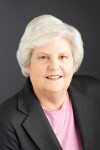AARP Hearing Center
Uniting to Support Family Caregivers
By Nancy A. LeaMond, May 17, 2024 10:51 AM

In today's polarized political climate, it's refreshing to gather in genuinely bipartisan settings where leaders emphasize working together and solving problems. This week, I had the privilege of participating in such an opportunity… the Engage State of the Majority Summit. Engage is a non-profit bipartisan organization founded by Rachel Pearson with the goal of bringing people together, regardless of political affiliation, to find practical solutions to the challenges women face throughout their lives.
At the summit, I joined a panel of family caregiving champions – Congresswoman Jen Kiggans (R-VA), Congresswoman Linda Sanchez (D-CA), and Dr. Meena Seshamani, deputy administrator and director of the Center for Medicare at CMS – to talk about how federal policy can do more to support the 48 million Americans who are helping care for spouses, parents and other adult loved ones.

Consider this: family caregiving is a responsibility that knows no bounds of age, race, or gender. It's an unpaid labor of love that can be emotionally, physically and financially challenging.
The statistics paint a sobering picture:
- 61% of family caregivers are juggling caregiving responsibilities with work;
- More than half (56%) report that their role as caregivers makes it hard to care for their own mental health, and just under a quarter (23%) say the same about their physical health;
- Close to 8 out of 10 routinely pay for care expenses out of their own pockets, spending an average of $7,242 annually;
- Women over 50 who leave the workforce to care for aging parents can lose more than $300,000 in lifetime wages and retirement income.
All four of us on the panel have been – or currently are – caregivers. And when we asked the audience, a sea of hands went up. This is something that touches everyone, and, Dr. Seshamani noted: “As our society ages, that’s just going to increase the foundational role that caregivers play in our healthcare system.”
Representative Sanchez reinforced the looming challenge, observing that “we don’t live in a world anymore where fathers are breadwinners, mothers can stay at home, and grandparents help take care of the kids. Instead, many parents now work two to three jobs just to make ends meet . . . while also bearing the additional responsibility of caring for parents or loved ones.”
Representative Kiggans, a geriatric nurse practitioner before entering Congress, reflected on her time working in memory care, noting: “There wasn’t a lot we could do for the actual patient, but what we could do was support the caregiver… make sure we prioritized things like support groups, education, and connecting them to resources.”
All three of these officials are promoting legislative or administrative efforts to support family caregivers. Their initiatives include increasing mental health resources for folks caring for veterans, promoting better health outcomes for older adults, facilitating training for caregivers who take on medical and nursing tasks, and advocating for tax relief to alleviate financial burdens. Their leadership and commitment gives me hope that Congress and the Administration can work together to ensure caregivers nationwide receive the support and resources they need and deserve.
































































